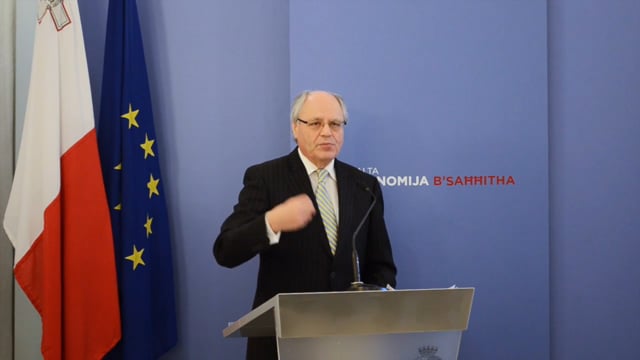[WATCH] Finance minister ‘surprised’ at TTIP study’s warnings for Malta
Edward Scicluna says deficit on track to reach 0.2% of Malta's GDP by 2018


Finance minister Edward Scicluna admitted that he was "surprised" at the conclusions of a study that found that Malta will be the only European economy that stands to decline as a result of a proposed free trade agreement between the EU and the US.
The study - carried out by the World Trade Institute - revealed that the Transatlantic Trade and Investment Partnership (TTIP) is likely to boost EU member state income levels by 0.5%, with the sole exception of Malta where it is predicted to slump by 0.3%. Investment is also predicted to decline by 0.7%.
However, Scicluna was unconvinced by the WTI's reasoning - that Malta trades more with China and Canada than it does with the US. "The government will conduct its own analysis on the effects and announce our findings at a later date, but I'm surprised that Malta was marked negatively due to its business with China," he told MaltaToday at a press conference.
In the hour-long press conference, the finance minister reviewed the government's economic policies and achievements since its accession to power in 2013.
"Malta's economy has gone from strength to strength since 2011, and the deficit is on track to decrease to 0.2% of the GDP by the end of 2018," he said. "However, these results havent come out of thin air, but are the results of implemented Labour policies."
He noted that private consumption increased by 4.5% last year, while the investment rate as a percentage of GDP increased from 17.1% in 2011 to 18.7% in 2015.
The employment rate increased from 58.7% in 2011 to 65.2% in 2015, particularly notable for women - whose employment rate shot up from 42.2% to 52.8% during that period.
Scicluna hailed these achievements as the fruit of policies to "make work pay", such as by reducing the personal income tax rate, tapering social benefits, introducing in-work benefits, and launching the Youth Guarantee scheme.
He argued that the introduction of free childcare, the breakfast club at schools,and the national maternity fund have contributed to the rise in female employment.
The minister also toasted the government's first-time buyers' scheme - noting that 4,007 people bought their first property in 2014 and 3,946 did so in 2015, compared to a mere 145 buyers in 2013. The number of promise of sale agreements shot up from 8200 in 2008 to 13,668 in 2015.


.png)

.png)



.jpg)




.jpg)






.png)


